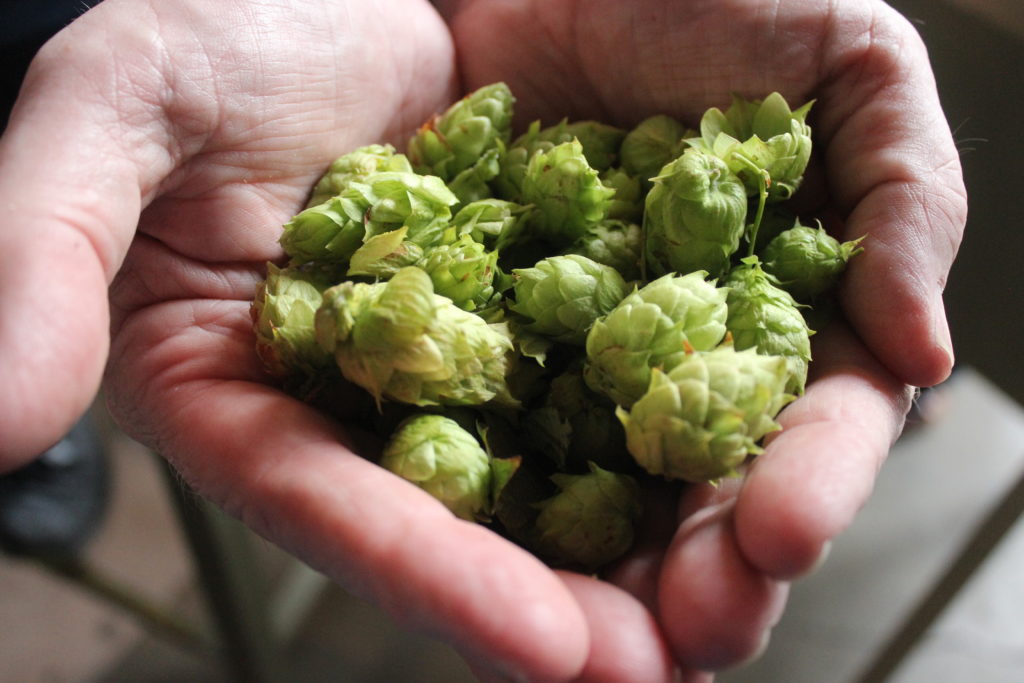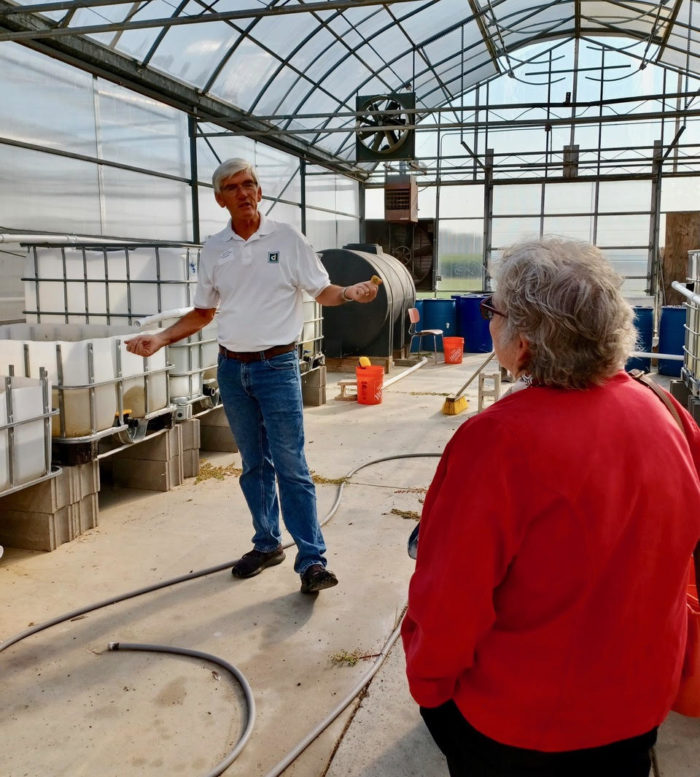By MEGAN SUTHERLAND
BG Independent News
If you’ve seen or heard about the Agricultural Incubator Foundation but were unsure exactly what it does, “you’re not alone,” according to David Little, AIF’s President of the Board. “I know many people have driven past here and wondered just what goes on behind those gates?” Addressing a small but diverse audience of teachers, researchers, growers, and a statehouse representative, he adds, “Hopefully today we’ll give you a snapshot of that.”
The gates he’s referring to lead to a 140-acre property, filled with traditional crops, garden plots, greenhouses, outbuildings, and a large pond and native wildflower garden.
“The term incubator can confuse people, making them think we’re hatching chicken or fish eggs,” says member of the board, Julie Lause. But what is being incubated here is innovation, collaboration, and research, and although there are some fish being produced, it might not be for the reasons you’d expect.
At CIFT’s September Agribusiness Forum, Little described the AIF as a “non-profit, educational, and research-focused organization promoting the development of agriculture systems that are economically, ecologically, and socially sustainable.”
So how does this translate into the programs and projects that are going on behind those gates?
For Moira van Staaden, Operating Manager of Radmantis Inc., it translates into a local aquaculture research site for her organization. Radmantis is a tech company that utilizes AI to gather data on aquatic animal populations and automate fish sorting for use in conservation and improved seafood production.
They are currently developing a means to eliminate or restrict the movement of the invasive lamprey eel in the Detroit River as well as finding ways to create efficient aquaponic food production for use in Third World countries.
The company, which was recently awarded a $500,000 grant from NOAA, utilizes the pond and a greenhouse at AIF for this research work with trout they grow on-site. “It’s really exciting,” says AIF Program Manager Vicki Gallagher, “It’s a great alliance.”
Other alliances include several school groups and universities, such as BGSU, OSU, Central State, Lourdes College, Penta Career Center, and local chapters of the FFA. Dr. Angélica Vázquez-Ortega of BGSU is currently analyzing the possible agricultural uses of dredge sediments on farm soils and BGSU students have been studying the effects of run-off water from differing types of agriculture on Tilapia.
The AIF also hosts the Northwest Ohio Cooperative Kitchen (NOCK) which is a program of the Center for Innovative Food Technology. The kitchen may be one of the most well-known programs at the AIF, and it has been a successful community resource, assisting many local entrepreneurs with food production space.
The Glass City Mashers are a beer, mead, and cider homebrewing club of Northwest Ohio and Southeastern Michigan, who use the space not to process, but to cultivate. The iconic Hop Yard at the AIF produces eleven different varieties of hops. These are grown, harvested, and dried by the club, and then distributed to their members, who craft them into all sorts of unique micro-brews.
The AIF also incubates agribusinesses in line with their mission. Pioneer and the Andersons conduct plant research on-site, and several local businesses use the space as a launching pad. Currently on-site isa local landscaper, a fence company called Next Fence, which produces a wood and blended composite fence that is “guaranteed for a lifetime,” and several community members who grow and sell market vegetables and flowers from their community garden plots.
The community gardens on-site, however, have no requirements for what their gardeners do with what they produce. Community plots range from $40 to $60 a year and include tilling and water usage, as well as guidance from AIF’s new Program Manager, Vicki Gallagher, an experienced master gardener and horticulturist.

Gallagher brings with her over 35 years of experience in the field of community gardening, small scale agriculture, and environmental sciences, and she’s not the only one. The board of AIF is made up of about 15 people with backgrounds in research, education, and farming who actively work toward its mission. “There’s another asset that this organization has, which I think is a very strong asset,” says Bill Hirtzel of Hirtzel Farms, “and that is its people.”
The 23-year-old organization is consistently changing, based on the needs and interests of the people who use it. Bernie Scott, Board Member and retired Otsego teacher, remembers the first spark of AIF’s creation at a meeting of county agriculture teachers. They saw both a need and an opportunity and they took a chance, and that spirit of innovation and adaptation has continued in the AIF’s mission ever since.
“To me this is really something, that people are willing to put themselves out there and see what works and what doesn’t,” reflects Lause. “It’s success and failure and that’s what these people are willing to accept. It’s a different way of thinking.”
The AIF has several upcoming events, such as the Backyard Mushroom Production Workshop, Oct. 8, and the NOCK Open House, Oct. 11. It also sponsored the recent Wood County Ag-Venture Self Driving Farm Tour.
All events are free and open to the public. More information can be found on their website at www.agincubator.org.

